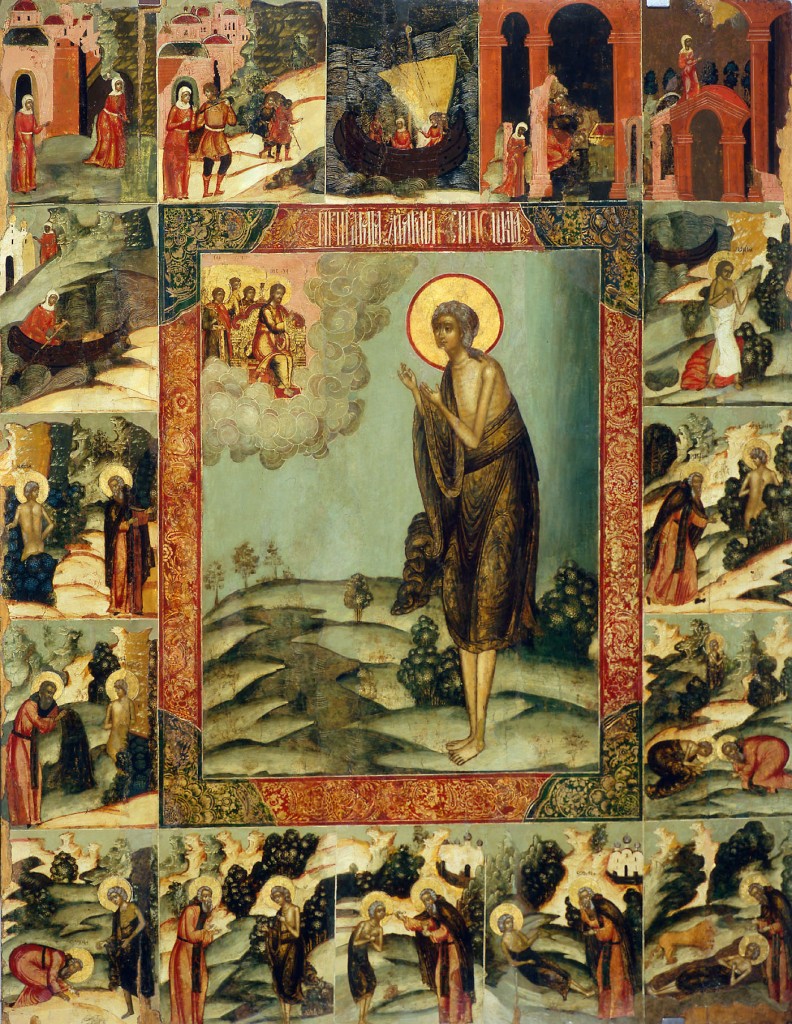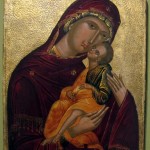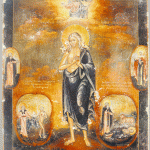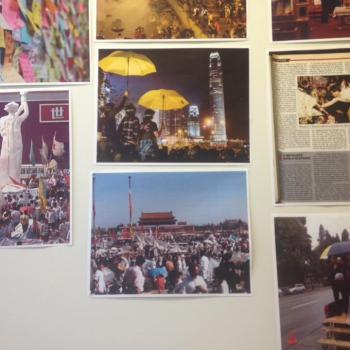
This is the second in a series of posts on the Great Canon of St Andrew of Crete, a penitential service in the Byzantine cycle for the Great Fast that quite literally changed my body to pray in a Byzantine way. The first post was about how I struggled to do prostrations because I was completely unprepared for the Great Canon. Perhaps it will also become clear through this series why I have a special love for the desert hermit, our Venerable Mother Mary of Egypt, in whose life the Most Holy Theotokos also plays a special role.
As I said in my last post on the Great Canon, I came completely unprepared to the Great Canon of St Andrew of Crete, during which the Life of St Mary of Egypt was read. Because of this, my initial approach to both came with a lot of preconceived baggage that was brought to the fore during the practice of the prostrations and the reading of the Life of St Mary. Because of the book study on Frederica Matthewes-Green’s Facing East I had attended the week before, I had an inkling that the Life of Holy Mary of Egypt would be about her repentance from an unchaste life. However, as my spiritual father began reading the Life, I began to be impatient because it seemed like it all revolved around a guy called Abba Zosima, a monk who went from place to place trying to show off how good he was at ascetic practice and get new tricks for the bag.
But all I could think of the first time Abba Zosima was mentioned was the character of Abba Zosima in Fyodor Dostoevsky’s Brothers Karamazov.
Depending on how one wants to count it, it can be argued that the first book I read when I began my doctoral studies was The Brothers Karamazov. I count this as my first time really through the book because I had read a bad translation of it in high school and barely understood what was going on. On this second reading in August to September 2009, it was like the text came alive; such is the magic of the Pevear and Volokhonsky translations. Of course, if one wants to count earlier than that back into the summer, I was finishing up Susan Howatch’s Church of England series, which I had also begun in high school. The Howatch series is fascinating because it’s a cross between trashy romance novel with steamy scenes galore and probing psychoanalyses of Anglican clergy, producing a very interesting reading of all the factions of the Anglican tradition (trust me, there are many factions in Anglicanism) as an exorcism tradition where the demons are somewhere between real presences and Jungian archetypes.
If you couldn’t tell, I was reading that summer to figure out who I was spiritually and ecclesially. In both the cases of Howatch and Dostoevsky, one can make the argument that their central drama revolves around the characters’ daddy issues, both biological and spiritual. In Howatch’s series, all the various Anglican priests’ sexual issues seem to stem from some controlling father figure; they’re all repeats of Oedipus in the sense that they all seem to be able to break free and become real priests only when they detach themselves from their fathers’ expectations for who they should be as Anglican priests, and this seems to have the added side effect of them not sleeping around anymore because they don’t need mommy to comfort them anymore. In Dostoevsky, the whole plot circles around which of the four sons (inclusive of Smerdyakov here) kills the father. For the central characters in both, the path toward getting rid of the father seems to be to get a spiritual father – ‘spiritual directors’ like Jon Darrow and Lewis Hall in Howatch and the starets (‘elder’) Abba Zosima in Dostoevsky. Perhaps more under the influence of Howatch than of Dostoevsky, I was also searching for a spiritual director/starets/spiritual father in my own right at this time, but what this has to do with my own relationship with my biological father, I do not care to divulge at the moment, except to say that I am not naïve enough to think that I was not reading my own Oedipal complex into both Howatch and Dostoevsky that summer. Forgive me, a sinner.
Of course, the real reason I was reading The Brothers Karamazov was because Professor Ralph Wood, a very respected scholar of literature and theology at Baylor University, was coming to town (the real reason I was reading Howatch, on the other hand, is because I am a pervert interested in the sex lives of Anglican clergy). Not only was Wood giving lectures at the University of British Columbia’s (UBC) English Department (during which he lectured on Tolkien) and at Regent College (during which he lectured on Flannery O’Connor), but he wanted to give the Graduate Faculty Christian Forum, run at UBC at that time by InterVarsity Christian Fellowship, some of his latest research on Dostoevsky.
Wood wanted to make the rather immodest claim that The Brothers Karamazov was the premier novel of modernity. He argued that Dostoevsky used The Brothers Karamazov to perform a diagnosis of modernity, trying to figure out the modern condition. To further spell this out, Wood introduced us to two scholars who have (thanks to Professor Wood) had quite the impact on my own work – the Catholic political theologian William T. Cavanaugh and the Archbishop of Canterbury Rowan Williams. With Cavanaugh, Wood was able to show how Dostoevsky was wrestling through attempts to Westernize Russia in the nineteenth century, which in some senses was messing with the place of the Orthodox Church in relation to a state and economy increasingly conceptualized as sovereign and autonomous, which sometimes positioned Christianity outside of its ecclesial context. With Williams, Wood showed that the characters throughout the novel all seem to live completely free, autonomous, and individual lives, leading them to the nihilistic core represented by the character of Ivan, the free-thinking son who says, ‘If God is dead, all things are permitted.’ In this regard, Wood argued through Williams that the real heroes of The Brothers Karamazov are Abba Zosima and Dmitri, who both seek to show in their own way that in fact ‘all are responsible for all’ – or in Williams’s dictum, ‘All are responsible to make all responsible’: Zosima does this through his ministry, Dmitry by confessing like a raving madman his share of the metaphysical responsibility for killing his father even though it is likely that he had no material connection to the crime. This, Wood contended, meant that Dostoevsky had diagnosed the modern condition of autonomous nihilism and supplied two characters – Zosima and Dmitri – to give an anti-modern alternative: the connection that we have with each other is unbreakable, making us each in fact responsible for the other. When he said this, a conservative Anglican I was sitting next to leaned over to whisper in my ear, Funny how he actually likes Williams. I only ever hear bad things about him with regard to the sexuality crisis in the Communion, but this might make me rethink things.
Because of this, Wood argued that the central characters in The Brothers Karamazov did not include Alyosha, the young and innocent character through whose eyes most of the novel seems to be written. In fact, Wood simply suggested that Alyosha simply works his way through the book almost as a non-character, not really sure who or what he is, whereas you really feel the heat of metaphysical connection with Dmitri and Zosima and even the drama of autonomous nothingness with Ivan.
But funny enough, the character with whom I connected most when I read the book before the lecture was in fact Alyosha. Perhaps some of this had to do with reading Howatch and watching how he watches Zosima even after his death. Perhaps it is also because I am nothing without a father and a master and this is really all about my own daddy issues, biological and spiritual.
In any case, I happen to really like Alyosha because by the end of the book, he’s on the beginning of his own journey. After all, the death and funeral rites of Abba Zosima take up a considerable chunk of the middle section of the novel. Though Abba Zosima is technically still around because of the resurrection, Alyosha feels his absence keenly, not least because Abba Zosima in fact sends him out into the world – literally kicks him out of the monastery in order for him to serve the world. Alyosha begins to hang out with a group of rag-tag boys and one of them – Ilyusha – unfortunately falls sick and dies and he has to walk with them through that boy’s death. In so doing, Alyosha comes into his own as a man, reconciling himself to both the absence of his spiritual father and the death of a boy under his care through the resurrection:
‘Karamazov!’ cried Kolya, ‘can it really be true as religion says, that we shall all rise from the dead, and come to life, and see one another again, and everyone, and Ilyushechka?’
‘Certainly we shall rise, certainly we shall see and gladly, joyfully tell one another all that has been,’ Alyosha replied, half laughing, half in ecstasy.
‘Ah, how good that will be!’ burst from Kolya.
‘Well, and now let’s end our speeches and go to his memorial dinner. Don’t be disturbed that we’ll be eating pancakes. It’s an ancient, eternal thing, and there’s good in that, too,’ laughed Alyosha. ‘Well, let’s go! And we go like this now, hand in hand.’
‘And eternally so, all our lives hand in hand! Hurrah for Karamazov!’ Kolya cried once more ecstatically, and once more all the boys joined in his exclamation. (Dostoevsky, The Brothers Karamazov, p. 776).
It is here that Alyosha, himself a young man, becomes as Zosima was to his people – a man who declares that all are responsible for all because of the resurrection, because of the cry of Memory eternal at the end of the funeral services. Having worked through his daddy issues, Alyosha comes to see his brotherhood with his own brothers and with the boys, that the resurrection makes sisters and brothers of us all.
When I heard the name Zosimas in the Life of St Mary of Egypt, then, it cued me back into my identification with Alyosha, my own quest for a spiritual father, the first book that I read as I began my doctorate. Though I was impatient to get to the meat of the story of Holy Mary of Egypt, Abba Zosima’s search for a monastery that could teach him new things about the ascetic life was fascinating in its own right, almost like hearing the backstory of a spiritual father that I had fantasized about having (not to mention that the story was in fact being read by the priest who is now actually my spiritual father).
The thing that struck me about the exposition of the life of Abba Zosima is that it really feels like the guy is struggling with not struggling. Unlike me struggling to do the prostrations, he has no problem with them and knows when to do them. Unlike me struggle with the ascetic practices like fasting and (god forbid) truly all-night vigils, Zosima has been doing them like a boss. Unlike me struggling with concentration in mental prayer, Zosima goes out into the desert after Forgiveness Sunday and is disciplined enough to go it as his own, even while he hopes to find someone in the desert to teach him more tricks in the ascetic life. Even though it is quite obvious from the genre of the hagiography that Zosima is being set up to be humbled, I couldn’t help being drawn to this guy – like Alyosha, like the characters in the Howatch novels – to think that perhaps this is the kind of person I’d been looking for as a spiritual father. After all, he knows that he is still lacking, but he’s still the very best of what I’d want from a teacher, a director, a spiritual father, even a starets.
Off in the distance, Abba Zosima sees a figure, one who looks human but he can’t really tell. Running after the figure, he hears the figure call him by name, and he trembles: the figure is a wizened old woman whose thin and shrivelled body bears all the marks of ascetic practice, and she is clairvoyant – she knows his name without ever having met him. Trembling, he throws her his cloak at her request, and she asks for his blessing. When he asks for her prayers in turn, she hesitates, but then accepts his request as one who presides over the Eucharist, and begins to speak in tongues. When Zosima becomes impatient at how long her prayers are taking, he looks up and sees her levitating from the ground, and seized with terror, he prostrates and cries, Lord, have mercy, over and over. And when he entertains doubts that she is really a woman, she hears his thoughts and tells him to stop doubting.
To see myself in Alyosha and in the Anglican clergy with daddy issues in the Howatch novels is already overdetermination enough, but to so identify myself in their quest to find a spiritual father to resolve their daddy issues was what led to a weird psychoanalytical moment when I got to this part of the story. To see myself not only in the sons, but in the spiritual father who saves from the biological father, and then to hear the spiritual father so completely humiliated by Holy Mary of Egypt in a part of the story read by my own spiritual father who has a devotion to Holy Mary of Egypt was unnerving. It was as if Holy Mary of Egypt then looked at me and said – Are you seeking a father, a spiritual father? Are you seeking to be completed by him, to be set free by him? Do you not know that such a one does not exist?
I always say that Holy Mary of Egypt came out of her story – indeed, came straight out of heaven where she gazes in perfect contemplation at the one whom she loved in the Palestinian desert for so long – and grabbed me and threw me to the ground such that I kept crying, Lord, have mercy. This is not an exaggeration, and this story perhaps explains a bit of why – it was because she pinpointed my search for a spiritual father to complete me as a form of idolatry and an idle fantasy. Discernment does not come from following a father around. Clairvoyance, the charismata, the levitation – each of these the signs of deeply clear discernment – such ecstasy comes only by prayer and fasting, the way of the desert. As my own spiritual father told the story at my chrismation, the monk who sought an elder to ask what new ascetic practices he could do to become perfect was told by the elder as he showed him fire shooting from his fingers, You can become all flame.
I do not know if Dostoevsky was thinking this as he worked his way through the Alyosha character; I suspect he modeled his Abba Zosima off of the Life of Holy Mary of Egypt. But as Alyosha remarks in almost total ecstasy the words of the resurrection as almost his own spiritual father would have, I feel that he is not copying Zosima; he has become a man in his own right. His spiritual father is but his brother in the resurrection; his togetherness with the boys is not as elder to boys, but as fellow eaters of the ancient and eternal pancakes. Like the starets in The Way of a Pilgrim, the guide is only there to get the pilgrim started on prayer without ceasing; like the ‘famous John the Sabbaite’ who confessed obliquely to beating one of his spiritual sons in The Ladder of Divine Ascent, obedience to one’s spiritual father does not mean that the father is complete; as Holy John of the Ladder recounts John the Sabbaite speaking of the monk who eventually dies from the latter John’s spiritual abuse, ‘I have committed murder.’ I am blessed to have a spiritual father who tells me constantly not to trust him, to discern and even second-guess, to be aware that he too is a man of many sins; despite my own daddy issues, the Holy Spirit has been good to me in showing me that to find completion in a daddy is futile, that the best of the fathers lie prostrate crying Lord have mercy beneath the levitating feet of Holy Mary of Egypt, that discernment is to be found in the way of the desert, that I must become a man of the resurrection – to be like Alyosha: fully modern, fully Orthodox, fully a part of the secular world, autonomous and yet responsible to make all responsible for all. The meditation with which I began in my doctorate took on a new dimension as I heard the first part of the Life of St Mary of Egypt, as Holy Mary of Egypt confronted the falsest of my deepest longings and questioned the core of my false consciousness.
We have not yet gotten to Holy Mary of Egypt’s own life. That will be for the final post in this series.
















